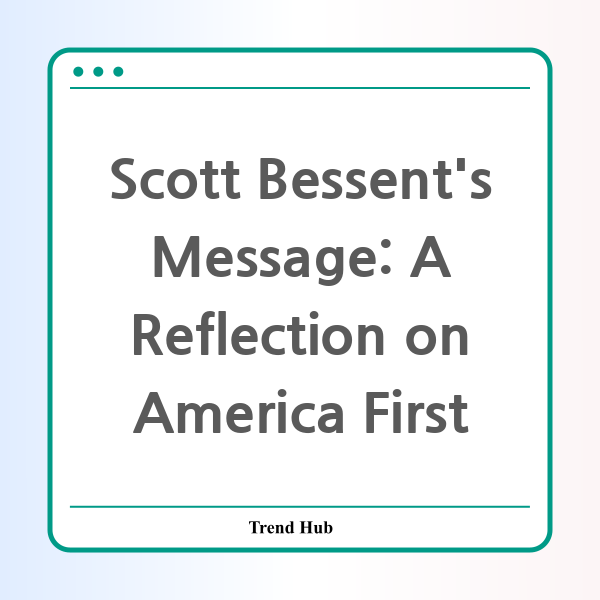* This website participates in the Amazon Affiliate Program and earns from qualifying purchases.

In a world where political messaging often gets lost in translation, U.S. Treasury Secretary Scott Bessent made headlines with a simple yet powerful statement during his recent visit to Ireland. While traveling for official duties, Bessent took a moment to sign the welcome book at Shannon Airport, leaving behind the two-word motto, "AMERICA FIRST!" This bold declaration not only underscores the Trump administration’s foreign policy stance but also highlights the significance of reaffirming America's global priorities.
Bessent's unambiguous message resonated amid ongoing geopolitical tensions, particularly regarding U.S. involvement in international conflicts. As he prepares for discussions with Ukrainian President Volodymyr Zelenskyy about sanctions and U.S. funding, Bessent's focus on national interests becomes even more critical. The urgency of these conversations reflects the dire situation in Ukraine, where the ongoing conflict has resulted in tremendous human and financial costs.
Reflecting on the implications of Bessent's message, it’s essential to contextualize it within the broader framework of U.S. foreign policy. The phrase "AMERICA FIRST" embodies a strategic emphasis on prioritizing American interests abroad while fostering a sense of national security and empowerment at home. This approach, which has been a cornerstone of the Trump administration's agenda, seeks to reposition America as a leader that engages with the world on its own terms.
Earlier this week, the President mandated Bessent to lead discussions with Zelenskyy as part of a concerted effort to forge a peace deal that would put an end to the ongoing war. The talks will revolve around pivotal topics such as sanctions, the procurement of rare Earth minerals, and an overall assessment of U.S. financial involvement in Ukraine. The expectation is that these discussions will pave the way for a more resilient and independent Ukraine, capable of navigating its sovereignty amidst external pressures.
Furthermore, the presence of Vice President JD Vance in Ukraine reinforces the administration's commitment to addressing international conflict. Vance's concurrent meetings with Zelenskyy signify a united front, emphasizing that America is not merely a bystander in global affairs but a proactive participant seeking resolution.
In light of these developments, it’s crucial for Americans to stay informed and engaged with how their government is navigating complex international relationships. The stakes are high – not only for Ukrainians but for global stability and the integrity of the U.S. foreign policy framework. Bessent's visit serves as a reminder that the principles of America’s foreign engagement are ever-present, even in the face of adversity.
As the situation unfolds, observers will be keenly watching how the administration balances its America First policy while addressing the humanitarian and geopolitical complexities that define the current global landscape. Will Bessent's straightforward message translate into effective diplomatic action? Only time will tell, but one thing is clear: the focus remains firmly on placing American interests at the forefront of international relations.
* This website participates in the Amazon Affiliate Program and earns from qualifying purchases.